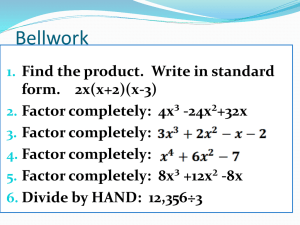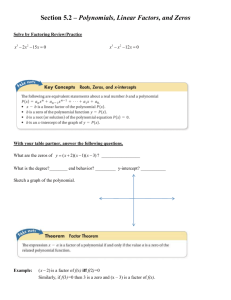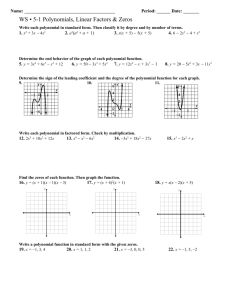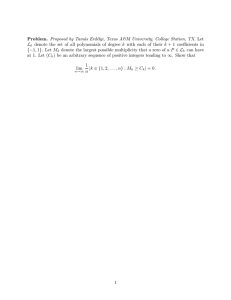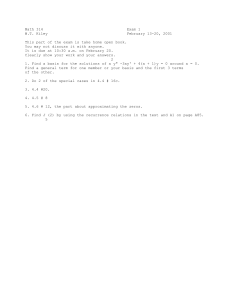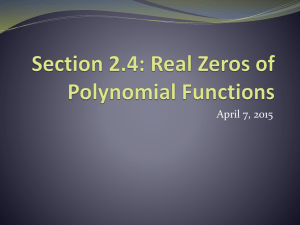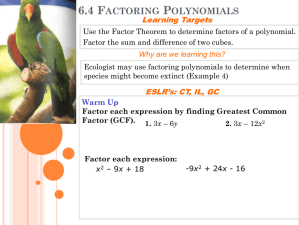QUESTIONS ABOUT POLYNOMIALS WITH {0, −1, +1} COEFFICIENTS Peter Borwein and Tam´
advertisement
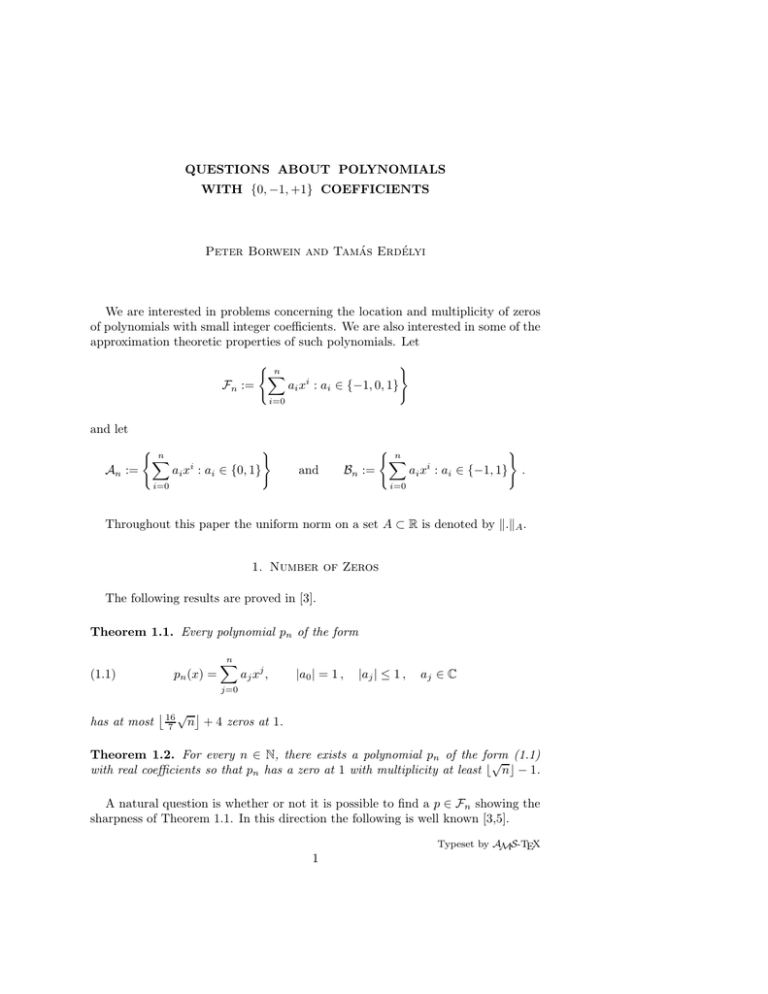
QUESTIONS ABOUT POLYNOMIALS
WITH {0, −1, +1} COEFFICIENTS
Peter Borwein and Tamás Erdélyi
We are interested in problems concerning the location and multiplicity of zeros
of polynomials with small integer coefficients. We are also interested in some of the
approximation theoretic properties of such polynomials. Let
Fn :=
( n
X
i=0
i
ai x : ai ∈ {−1, 0, 1}
)
and let
An :=
( n
X
i=0
i
ai x : ai ∈ {0, 1}
)
and
Bn :=
(
n
X
i=0
i
ai x : ai ∈ {−1, 1}
)
.
Throughout this paper the uniform norm on a set A ⊂ R is denoted by k.kA .
1. Number of Zeros
The following results are proved in [3].
Theorem 1.1. Every polynomial pn of the form
(1.1)
pn (x) =
n
X
aj xj ,
j=0
has at most
|a0 | = 1 ,
|aj | ≤ 1 ,
aj ∈ C
16 √ n + 4 zeros at 1.
7
Theorem 1.2. For every n ∈ N, there exists a polynomial pn of the form
√ (1.1)
with real coefficients so that pn has a zero at 1 with multiplicity at least ⌊ n⌋ − 1.
A natural question is whether or not it is possible to find a p ∈ Fn showing the
sharpness of Theorem 1.1. In this direction the following is well known [3,5].
Typeset by AMS-TEX
1
2
PETER BORWEIN AND TAMÁS ERDÉLYI
Theorem 1.3. There is an p
absolute constant c > 0 such that for every n ∈ N there
is a p ∈ Fn having at least c n/ log(n + 1) zeros at 1.
Theorems 1.1 and 1.3 show that the right upper bound for the
p number of zeros
a√
polynomial p ∈ Fn can have at 1 is somewhere between c1 n/ log(n + 1) and
c2 n with absolute constants c1 > 0 and c2 > 0.
Problem 1. How many zeros can a polynomial p ∈ Fn have at 1? Close the gap
between Theorems 1.1 and 1.3. Any improvements would be interesting.
√The following pair of theorems is from [3]. Theorem 1.4 improves the old bound
c n log n given by Schur [7] in 1933, and up to the constant c this is the best
possible result.
Theorem 1.4. There is an absolute
constant c > 0 such that every polynomial p
√
of the form (1.1) has at most c n zeros in [−1, 1].
Theorem 1.5. There is an absolute constant c > 0 such that every polynomial pn
of the form (1.1) has at most c/a zeros at [−1 + a, 1 − a] whenever a ∈ (0, 1).
Problem 2. How many distinct zeros can a polynomial pn of the form (1.1) (or
pn ∈ Fn ) have in [−1, 1]? In particular, is it possible to give a sequence
√ (pn ) of
polynomials of the form (1.1) (or maybe (pn ) ⊂ Fn ) so that pn has c n distinct
zeros in [−1, 1], where c > 0 is an absolute constant? If not, what is the sharp
analogue of Theorem 1.4 for distinct zeros in [−1, 1]?
Problem 3. How many distinct zeros can a polynomial pn ∈ Fn have in the interval
[−1 + a, 1 − a], a ∈ (0, 1)? In particular, is it possible to give a sequence (pn ) of
polynomials of the form (1.1) (or maybe (pn ) ⊂ Fn ) so that pn has c/a distinct
zeros in [−1 + a, 1 − a], where c > 0 is an absolute constant and a ∈ [n−1/2 , 1)? If
not, what is the sharp analogue of Theorem 2.4 for distinct real zeros?
It is easy to prove (see [3]) that a polynomial p ∈ An can have at most log2 n
zeros at −1.
Problem 4. Is it true that there is an absolute constant c > 0 such that every
p ∈ An with p(0) = 1 has at most c log n real zeros? If not, what is the best possible
upper bound for the number of real zeros of polynomials p ∈ An ? What is the best
possible upper bound for the number of distinct real zeros of polynomials p ∈ An ?
Odlyzko asked the next question after observing computationally that no p ∈ An
with n ≤ 25 had a repeat root of modulus greater than one.
Problem 5. Prove or disprove that a polynomial p ∈ An has all its repeated zeros
at 0 or on the unit circle.
One can show, not completely trivially, that there are polynomials p ∈ Fn with
repeated zeros in (0, 1) up to mutiplicity 4.
QUESTIONS ABOUT POLYNOMIALS WITH {0, −1, +1} COEFFICIENTS
3
Problem 6. Can the multiplicity of a zero of a p ∈ ∪∞
n=1 Fn in {z ∈ C : 0 < |z| < 1}
be arbitrarily large?
A negative answer to the above question would resolve an old conjecture of
Lehmer concerning Mahler’s measure. (See [1].)
Boyd [6] shows that there is an absolute constant c such that every p ∈ Bn can
have at most c log2 n/ log log n zeros at 1. Is is easy to give polynomials p ∈ Bn
with c log n zeros at 1.
Problem 7. Prove or disprove that there is an absolute constant c such that every
polynomial p ∈ Bn can have at most c log n zeros at 1.
Problems 8 and 9 are about the spacing of the zeros of polynomials from Fn .
Problem 8. As a function of n, give a lower bound for the minimal distance
between two consecutive distinct real zeros of a polynomial from Fn .
Problem 9. As a function of n, give a lower bound for the minimal distance
between two distinct complex zeros of a polynomial from Fn .
The next question is a version of an old and hard unsolved problem known as
the Tarry-Escott Problem.
Problem 10. Let N ∈ N be fixed. Let a(N ) be the smallest value of k for which
there is a polynomial p ∈ ∪∞
n=1 Fn with exactly k nonzero terms in it and with a
zero at 1 with multiplicity at least N . Prove or disprove that a(N ) = 2N .
To prove that a(N ) ≥ 2N is simple. The fact that a(N ) ≤ 2N is known for
N = 1, 2, . . . , 10, but the problem is open for every N ≥ 11. The best known upper
bound for a(N ) in general seems to be a(N ) ≤ cN 2 log N with an absolute constant
c > 0. See [4]. Even improving this (like dropping the factor log N ) would be a
significant achievement.
2. The Chebyshev Problem on [0, 1]
The following two theorems are proved in [3].
Theorem 2.1. There are absolute constants c1 > 0 and c2 > 0 such that
√ √ exp −c1 n ≤ inf kpk[0,1] ≤ exp −c2 n .
06=p∈Fn
Theorem 2.2. There are absolute constants c1 > 0 and c2 > 0 such that
exp −c1 log2 (n + 1) ≤ inf kp(−x)k[0,1] ≤ exp −c2 log2 (n + 1) .
06=p∈An
In the light of the above two theorems, it is natural to ask the following questions.
Problem 11. Does
log inf 06=p∈Fn kpk[0,1]
√
lim
n→∞
n
4
PETER BORWEIN AND TAMÁS ERDÉLYI
exist? If it does, what is it?
Problem 12. Does
lim
n→∞
log inf 06=p∈An kp(−x)k[0,1]
log2 (n + 1)
exist? If it does, what is it?
3. Markov- and Bernstein-Type Inequalities for Fn
In [4] the following results are obtained.
Theorem 3.1 (Markov-Type Inequality for Fn ). There is an absolute constant c > 0 such that
kp′ k[0,1] ≤ cn log(n + 1) kpk[0,1]
for every p ∈ Fn .
Theorem 3.2 (Bernstein-Type Inequality) for Fn . There is an absolute constant c > 0 such that
c
|p′ (y)| ≤
kpk[0,1]
(1 − y)2
for every p ∈ Fn and y ∈ [0, 1).
Problem 13. Is it possible to improve Theorem 3.1? It is tempting to think that
the factor log(n + 1) can be dropped.
Problem 14. Is it possible to improve Theorem 3.2? It is tempting to think that
the the factor (1 − y)−2 can be replaced by (1 − y)−1 .
References
1. F. Beaucoup, P. Borwein, D. Boyd & C. Pinner, Multiple roots of [-1,1] power series, (to
appear).
2. P. Borwein & T. Erdélyi, Polynomials and Polynomial Inequalities, Graduate Texts in Mathematics, nos 161, Springer-Verlag, New York, 1995.
3. P. Borwein, T. Erdélyi & G. Kós, Polynomials with restricted coefficients, (to appear).
4. P. Borwein & T. Erdélyi, Markov- and Bernstein-type inequalities for polynomials with restricted coefficients, (to appear).
5. P. Borwein & C. Ingalls, The Prouhet, Tarry, Escott problem, Ens. Math. 40 (1994), 3–27.
6. D. Boyd, On a problem of Byrnes concerning polynomials with restricted coefficients, (to
appear).
7. I. Schur, Untersuchungen über algebraische Gleichungen., Sitz. Preuss. Akad. Wiss., Phys.Math. Kl. (1933), 403–428.
Department of Mathematics and Statistics, Simon Fraser University, Burnaby,
QUESTIONS ABOUT POLYNOMIALS WITH {0, −1, +1} COEFFICIENTS
5
B.C., Canada V5A 1S6 (P. Borwein)
Department of Mathematics, Texas A&M University, College Station, Texas
77843 (T. Erdélyi)
